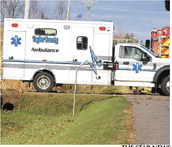County works to keep ambulance shifts covered
Ambulance services in Taylor County are making the transition from being largely volunteer and paidon- call based, to having full-time workers staffing posts.
This trend has been happening for several years and is accelerating as the paid-on-call crew members are declining shifts. According to ambulance director John Deal of Aspirus, of the 38 people on the books for the ambulance service, a quarter of them have not taken a shift in the past three months.
“My goal is to have all of my shifts covered,” Deal said to members of the Taylor County Law Enforcement and Emergency Services Committee on Friday. Historically, the county has relied on volunteer and paid-on-call crews who receive a stipend for being available for a call and who then get paid at time-and-half of the hourly rate while on the call.
In order to ensure shift coverage, the county has authorized Aspirus to increase full-time staffing allowing emergency medical technicians (EMTs) to be hired and scheduled to fill shifts.
“Having them doesn’t do us a lot of good unless they are willing to take a shift,” he said of the paid-on-call crew members. He said that Aspirus is implementing a new policy that in order to remain on the rolls, all EMTs will have to take at least two shifts a month — the equivalent of 24 hours per month.
Committee member Lorie Floyd asked if the crew members were being required to go to training and keep up with their certifications. Deal replied that they have, so far, been meeting their competencies, while noting that new competency requirements were issued on April 1.
Deal said that recruiting efforts remain underway and that they are working with the schools to get students into EMT training programs. He said that Aspirus is offering options and recruiting heavily and even offering people positions while they are still in school.
Committee member Catherine Lemke asked if there was a reason why people weren’t taking shifts. She asked if it had to do with Aspirus requiring COVID-19 vaccination shots.
Deal responded that it is consistently the same group of people, but he noted that for some it was because they are working full-time jobs elsewhere and don’t have the time. As far as the COVID requirements, Deal said he felt they were past having issues with that. He said while Aspirus requires the vaccinations they allow waivers for approved reasons. He said Aspirus recently dropped the requirement for testing of non-vaccinated staff.
In related ambulance business, Deal said the county is able to advance to offering a paramedic level response on its ambulances through upgrading the defibrillators in the ambulances. The ambulance service is currently at an “advanced EMT” level which means that regardless of the level of qualifications of the the responder they can only provide care to that level. Upgrading to a paramedic level would allow someone with that certification to provide those additional lifesaving services.
To make it happen, the county would need to upgrade the ambulance-based defibrillators with external pacemaker devices which would help keep the patient’s heart rate regulated. The county had opted out of including those the last time they were purchased several years ago, because the crews would not be able to use them. Deal said he spoke with the manufacturers of the equipment and presented options.
The first is the county could do nothing and just replace the equipment when it is scheduled to do so in about another four years. The county could add the devices to the current defibrillators at a cost of $18,000, but would have to replace them in a few years. Another option would be to trade-in the current units receiving a $6,500 credit per unit and buying new ones. Deal also proposed an option to purchase four new paramedic level devices for $82,300 ahead of schedule and then sell the existing defibrillators to the Medford Area Fire Department to have on the fire engines to meet an NFPA standard.
Deal noted this would keep the equipment in the county and be useful if there was a mass casualty event.
Committee chairman Lester Lewis, who is also the chairman of the Medford Area Fire Commission, said the fire commission would have to approve it as well as the county. The fire commission doesn’t meet until late June.
According to Deal, Taylor County is the only area within the Aspirus system without the capability. No action was taken.
In other ambulance matters, Floyd asked questions regarding the contract between Taylor County and Aspirus. This was approved by the county board in April. She questioned how costs of running the service were being divided. Under the current contract the county is responsible for 45% of the expenses after income to operate the ambulance service. In the past the county had not had a formal cap in place.
“We’re still playing a guessing game,” Lewis said, noting that expenses have always exceeded payments. “You are running a gamble and you always will,” he said.
Floyd raised concerns with the contract language suggesting it could result in a higher burden being put on taxpayers. Lewis noted the contract is up in one year and will be looked at beginning in the fall.
In other law enforcement business, committee members: Received word from Sheriff Larry Woebbeking that the recording equipment in the department’s interview room is 20 years old and is beginning to fail. This is essential equipment, he said. It will cost about $5,000 to replace.
Discussed the future of portable radio communications in the county. Woebbeking said that the county may not want to remain on the state’s WISCOM network as new standards are being implemented which could require substantial expense with upgrades. He noted that not all agencies are on the state system.
Received word that interviews to replace the current emergency management director will take place on May 19.



